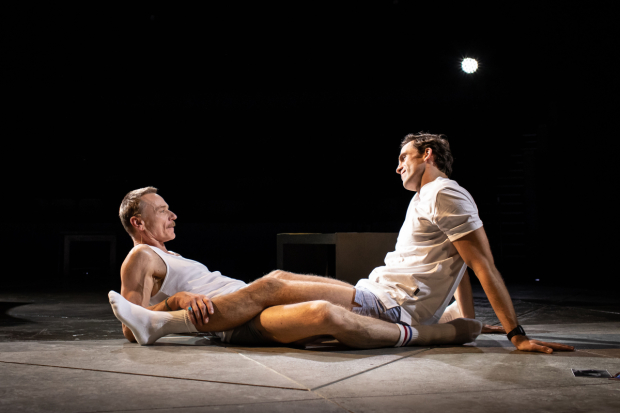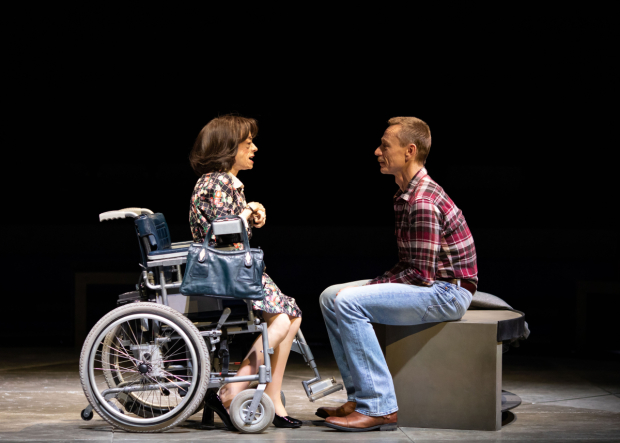The Normal Heart review – the National Theatre revives Larry Kramer's play
The seminal piece returns

© Helen Maybanks
"As a student, I was lucky enough to see the landmark Royal Court production of The Normal Heart, starring Martin Sheen," writes director Dominic Cooke on the National Theatre's website. "It had a profound effect on me and I've wanted to direct the play ever since."
I saw that production in 1986; it shook me to the core. Larry Kramer's cry from the heart was one of the first plays I remember watching that engaged with events that were still unfolding in the world around me. It is, as Cooke says, "that rarest of things: a history play written by one of its key participants."
It is the greatest tribute I can pay to Cooke's new production in the Olivier in the round that he makes its depiction of the early years of the AIDS crisis seem just as raw and horrifying as ever, while drawing from it larger more universal resonances, about love, and politics and society's reaction to disease.
This shattering evening of theatre opens with a moment of silence, as the cast gather around a cauldron, which they light in an act of remembrance for the millions who have died since the epidemic began. The flaming bowl is gently raised above Vicki Mortimer's crucible of a set, a grey circle with curving benches, and stays there throughout, a reminder and a challenge. Paule Constable's lighting moves at the same moment from sombre greys to flashing whites, as the men launch themselves into a hedonistic dance, a reminder of the club culture in which AIDS first emerged in New York.
The actual first scene is in the waiting room of Dr Emma Brookner (Liz Carr liberated from Silent Witness and full of powerful emotion) where Ned Weeks (Ben Daniels), the lightly-disguised figure of Kramer, is waiting to interview her about a new disease that is killing gay men and which the mainstream media is ignoring. With him, trembling with palpable horror, is Craig (Elander Moore) who knows that a positive diagnosis will be a death sentence.
From that point in July 1981 to the play's close in May 1984, Kramer traces with anger and compassion the story of his own early fight to get politicians and health officials to pay attention to the ravages of the disease and help for the tragic generation of men being wiped out by it. "Who cares if a faggot dies?" he asks. His work as an activist, both in life and on the page, was determined to make everyone care.
The drama charts the early years of the journey with brutal honesty, that encompasses debate within the gay community about just how effective Weeks' shock tactics and his "big mouth" are when faced with a political and social climate where being openly gay was still enough to lose you your job in a bank or a health department.
It also, incidentally asks – with eerie echoes for a time of Covid – just why it is so difficult for doctors to make the world sit up and take notice when an epidemic begins to kill people. "You leave too much margin for intelligence," Dr Brookner says at one point, when questioned about the lack of response to her early warnings. Arguments about civil rights versus social responsibility when facing a contagious illness are also raised.

© Helen Maybanks
The triumph of Cooke's production is the way it respects every beat of Kramer's political arguments and all his play's wit and style – it is often very funny – while never letting us forget that this here is above all a tragedy of men who lost men they loved, as friends and as partners. The narrative is punctuated by long moments where two people hug each other, their pain and their longing allowed to speak through silence. The performances are pitched as perfectly and sensitively as the direction. All are exceptional, but Danny Lee Wynter's conciliatory and camp Tommy, and Dino Fetscher's heartbreakingly youthful Felix stand out.
At the centre of it all is Daniels' outstanding performance as Weeks – bold, exasperating, angry, kind and ultimately in agony. He calibrates every revelation and feeling as if he is living each moment afresh. His scenes with his loving but resistant brother Ben (marvellous Robert Bowman) are perfect sonatas of the hurts and misunderstandings of family life, compressed into moments.
It's a wonderful revival and only sad that Kramer himself, who died last year, at the age of 84, still an activist, still controversial, didn't live to see it.












